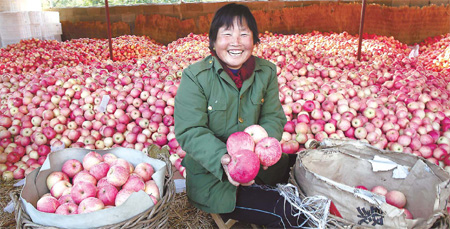Society
Fruits give farmers juicy bite of profits
By Duan Yan in Qixia and Hu Yongqi in Beijing (China Daily)
Updated: 2010-11-04 07:51
 |
Large Medium Small |
Big business
Another gamble farmers and wholesalers are taking is with cold storage, the destination for much of the produce bought in Qixia this year.
"About 80 percent of growers will put their apples in the cold storage," said Liang Aidong, 42, who has an orchard covering 12 mu (0.8 hectare) in Qixia's southern Guanli township.
Qixia has more than 600 cold storage facilities able to stock up to 1 million tons, roughly 70 percent of the city's total annual output, according to Qixia's fruit industry bureau.
The fruit and vegetables will stay there until the peak sale season: Spring Festival, the Chinese new year holiday, which falls according to the lunar calendar in either January or February.
"Prices of Chinese cabbage will probably hit 2.5 yuan a kilogram then," explained Dalian trader Han, 44.
Cold storage has become a big business in Qixia. Of the 72 million yuan in small loans issued by the city's Postal Saving Bank last year, an extremely high proportion went to cold storage facilities.
However, veteran trader Sun Shixian revealed much of the money is recycled as loans to brokers who cannot afford to pay farmers for their yields.
"It's difficult to get a loans from the bank so we have to borrow from the cold storage owners," he said, explaining that, on top of the storage fee, traders are usually charged 10-percent interest on the loans (the bank charges 6 to 7 percent).
Even when the produce is ready to be shipped, getting food from the "farm to the fork" is far from simple and, for many, is a serious factor driving up prices.
As logistics services is China remain relatively poor, companies are experiencing a great deal of wastage during distribution.
According to the China Agriculture Wholesale Markets Association, the average loss of fruit and vegetables is 25 to 30 percent, which costs the industry roughly 100 billion yuan a year. In most developed countries, wastage is limited to just 5 percent.
"Dozens of middlemen are involved in the transport process," said Chen Hewu, an analyst with China International Futures. "It needs to be slim-lined."
Transportation costs alone are high. For example, a recent survey by the Chinese Academy of Social Sciences shows that a freight company shipping 5 tons of carrots from Sichuan province in the southwest to Guangdong province would need to pay 3,500 yuan just in expressway toll charges.
"I have to add at least 1 yuan to each jin of apples to cover (transport) costs, otherwise I will lose money," said trader Sun Shixian.
When the fruit finally reaches a shopping bag, two apples will cost roughly 6 yuan.
"Imagine an ordinary person who makes 2,000 yuan a month, who can afford to pay 6 yuan for two apples?" asked Guanli farmer Liang, who added that current problems have convinced him to quit the business this year.
